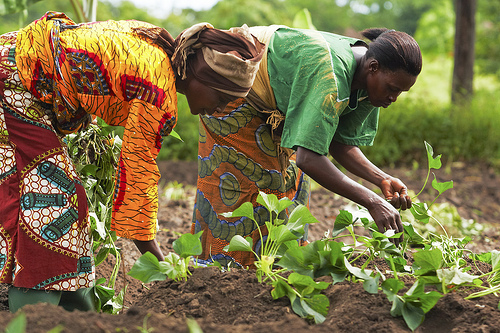Opinion
Victor Ejechi: Agricultural Production and the Development of the Nigerian Economy

The agricultural sector is seen as an engine that contributes to the growth of the overall economy of Nigeria. Despite these efforts, the sector is still characterized by low yields, low level of inputs and limited areas under cultivation due to government dependence on a mono-cultural economy based on oil. The sector faces many challenges, notably an outdated land tenure system, lack of access to finance, poor road network, supply-chain linkages, violent conflict, outdated system of agriculture etc. Still, the relationship between agriculture and development in Nigeria cannot be overemphasized.
As a roadmap to attaining development, the 2030 Agenda for Sustainable Development, adopted by all United Nations Member States in 2015, provides a shared blueprint for peace and prosperity for people and the planet, now and into the future.
At its heart are the 17 Sustainable Development Goals (SDGs), which are an urgent call for action by all countries – developed and developing – in a global partnership. They recognize that ending poverty and other deprivations must go hand-in-hand with strategies that improve health and education, reduce inequality, and spur economic growth.
Nigeria is a member state of the United Nations and if the SDGs is anything to go by, it shows that 70% of the development target group of the SDGs live in rural areas and are dependent on agriculture for a living. Invariably, reducing poverty, improving nutrition and general well-being of the population would imply improving the livelihood of this majority and this hinges critically on the performance of the agricultural sector.
Nigeria budget is usually earmark based on crude oil price while the agricultural sector is not much on the scene but that contributes more to the development in the country. According to the latest report released by the Nigerian Bureau of Statistics (NBS), in 2020, agriculture provided 23.63 per cent of Nigeria’s total Gross Domestic Product(GDP), followed by trade 14.94 per cent and telecommunication 12.18 per cent.
The oil sector which is one sector that is usually given more attention contributed only 8.16 per cent to the GDP in 2020. In 2019, the oil sector contributed 8.78 per cent while agriculture contributed 25.16 per cent. If we even pry further, we will see that trade, telecommunication and the manufacturing sector contributed more to the GDP of Nigeria when compared to the oil sector. So why so much noise about the oil sector?
If we go down history, we will realize that agriculture has been the mainstay of the economy since independence and despite several bottlenecks; it remains a resilient sustainer of the populace. In the 1960s, Nigeria was the world’s largest exporter of groundnut, the second-largest exporter of cocoa and palm produce and an important exporter of rubber and cotton.
A recent report by StatiSense, an international statistics firm with expertise in providing data services such as analytics, research, reporting, etc, has shown that Nigeria is the largest producer of Pineapples in Africa and the 7th producer in the world. Nigeria also took second place as the largest producer of Tomatoes in Africa and the 11th producer in the World.
The report which was released in December of 2020, showed the position of Nigeria as regards the agricultural production capacity, referencing documents from the UN Food and Agriculture Organization (FAO) which is a specialized agency of the United Nations that leads international efforts to defeat hunger.
The data also revealed that Nigeria is the largest producer of Yam in the World, accounting for over 70 to 76 per cent of world production. Nigeria also came in the fourth position with 2.4 per cent in the production capacity of Oil Palm Fruit in the world with Indonesia taking the first position with 59.8 per cent, Malaysia 24.1 per cent and Thailand per cent.
The relationship between the agricultural sector and other sectors should not be a competition but rather be viewed as interdependent where supply and demand in sectors can be accommodated through strengthened linkages. Neglect of the agricultural sector in favour of the oil sector will only lead to slow economic growth and inequality in income distribution. Therefore, even though agriculture may be unable to singlehandedly transform an economy, it is a necessary and sufficient condition in kick-starting industrialization in the early stages of development.
Victor Ejechi is the Media and Communications Specialist with StatiSense
Disclaimer
It is the policy of NewsWireNGR not to endorse or oppose any opinion expressed by a User or Content provided by a User, Contributor, or other independent party. Opinion pieces and contributions are the opinions of the writers only and do not represent the opinions of NewsWireNGR
kindly donate to the work we do using our interim PAYPAL https://www.paypal.me/NewsWireNGR






